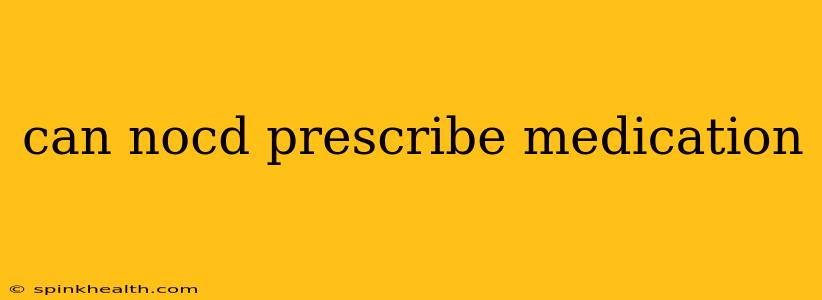Can a Non-Physician Clinician Prescribe Medication? The Case of OCD Treatment
The question of whether a non-physician clinician (like a nurse practitioner or physician's assistant) can prescribe medication for Obsessive-Compulsive Disorder (OCD) is complex and depends heavily on location and specific regulations. Let's unpack this, exploring the nuances and addressing common concerns.
My story begins not with a medical professional, but with my own struggles. For years, I battled the insidious grip of OCD, the relentless cycle of intrusive thoughts and compulsive behaviors stealing my peace and joy. I sought help, and that's when I learned about the different roles involved in mental health treatment. This journey taught me the importance of understanding the legal framework surrounding medication prescription.
Can Nurse Practitioners Prescribe Medication for OCD?
In many parts of the world, including the United States and Canada, nurse practitioners (NPs) with advanced training and the proper licensure can prescribe medication, including medications used to treat OCD, such as selective serotonin reuptake inhibitors (SSRIs). However, the specific laws vary from state to state (in the US) and province to province (in Canada). Some jurisdictions might require additional certifications or supervision by a physician. It's crucial to check the regulations of your specific location.
Can Physician Assistants Prescribe Medication for OCD?
Similar to NPs, physician assistants (PAs) in many regions can prescribe medication, but this depends on state or provincial regulations and their individual level of training and licensure. They often practice under the supervision of a physician, but the scope of their prescriptive authority varies.
What Other Mental Health Professionals Can Help with OCD?
While NPs and PAs might prescribe medication, other mental health professionals play crucial roles in OCD treatment. These include:
- Psychiatrists: These are medical doctors specializing in mental health who can diagnose and prescribe medication. They often play a central role in managing medication for OCD.
- Psychologists and Therapists: While they typically can't prescribe medication, they are invaluable in providing therapy, such as Cognitive Behavioral Therapy (CBT), a highly effective treatment for OCD. They work alongside prescribing clinicians to create a holistic treatment plan.
What Medications Are Commonly Prescribed for OCD?
Common medications used to treat OCD often include SSRIs like sertraline (Zoloft) and fluoxetine (Prozac). The choice of medication and dosage depends on an individual's response to treatment, other health conditions, and the clinician's assessment.
How Can I Find an Appropriate Clinician for OCD Treatment?
Finding the right clinician is paramount. Your journey starts with research:
- Your primary care physician: They can provide a referral to a psychiatrist, psychologist, NP, or PA specializing in OCD treatment.
- Online directories: Many online resources list mental health professionals in your area, allowing you to check credentials and specializations.
- Insurance provider: Your insurance company can provide a list of in-network providers specializing in OCD treatment.
Remember, receiving an accurate diagnosis and a personalized treatment plan are crucial for managing OCD effectively. Your health journey is unique, requiring a collaborative approach. Don't hesitate to seek multiple opinions and advocate for the best care possible.
Disclaimer: This information is for educational purposes only and should not be considered medical advice. Always consult with a qualified healthcare professional for diagnosis and treatment of any medical condition.

